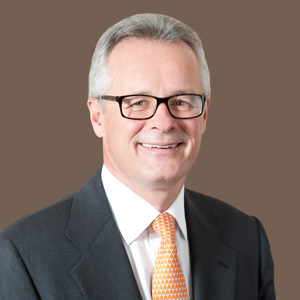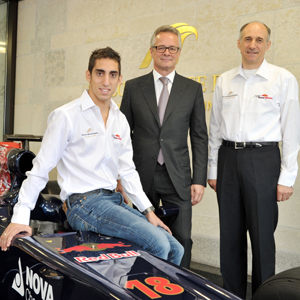Banking Crisis
EXCLUSIVE: A Phoenix From The Flames - Falcon CEO Discusses Reinvention

After assets halved following the sale from AIG, Falcon Private Bank CEO Eduardo Leemann candidly lays out his plan to rebuild AUM in five years - with the fastest growth in Asia.

Falcon CEO Eduardo Leemann
As far as reinvention goes, Falcon Private Bank must take first prize for the wealth manager which has been through the most change in the shortest period of time.
Three years ago it was the US$22 billion private banking arm
of American International Group, the (at the time) triple-A-rated
American insurance company.
Then the financial crisis took a grip and AIG’s rating started to
look
increasingly wobbly. Within weeks it was being rescued by the US
government
with a US$182.5 billion bailout – the largest given during the
financial
crisis.
AIG scrambled to sell off assets to repay the loan, which it
now has done in full. The private bank was one of the first bits
to go. Within a matter of
months, AIG Private Bank was sold to the Abu Dhabi government for
approximately
US$308 million – including US$55 million to pay back AIG’s debts.
When your shareholder structure changes so radically, going
from
an American triple-A company to a Middle Eastern sovereign wealth
fund, you have
to sit down and explain that to your clients – and it was not an
easy task, chief
executive
Eduardo Leemann told WealthBriefingAsia
exclusively.
“Not all clients are comfortable with Middle Eastern
investors,” he said, in an interview at the bank’s Hong Kong
office last week.
“We lost about 50 per cent of our assets after the sale. We went
from US$22
billion to US$11 billion of assets under management, ” he said.
Leemann has seen a lot. The former Goldman Sachs head of
private
banking, and former deputy head of private banking at Julius
Baer, had
been with AIG Private Bank since 1997. But in his 15 years at the
firm,
the last three have certainly tested his experience.
“Almost all of our Latin American clients left, a lot of our
Asian clients kept their accounts but withdrew money. Some of the
withdrawals
were due to the financial crisis but also people wanted to see
what would happen
under our changed ownership,” he said. The bank now does most of
its business with wealthy individuals in Switzerland, followed by
the UAE, Russia and Asia.
After the sale to Abu Dhabi's Aabar Investments, the private bank
totally overhauled
its structure. Within a year it had shut down its
Singaporean relationship manager business – cutting nine staff
out of ten – and turned it
into a booking centre. “You can’t do everything at the same
time, you have to focus. Our Singapore relationship managers
didn’t work out
with the new ownership structure,” said Leemann.
Early on the decision was made to cut most of the institutional
business in
Switzerland and spin out the retail business to
Swiss rival boutique Sarasin, now named Bank zweiplus, in which
they still own a minority stake.
In Hong Kong, which always has been and still
is its Asian hub, headcount plummeted from 100 in 2008, to 40
after the
sale, 15 of which are relationship managers. The team is
primarily focussed on
Greater China markets. It only has a couple of in-house products,
most advice
it offers is on third party products.
On the front foot
Now the bank is back up to 50 staff, but is eager
for more.
Leemann said he wants to hire “as many as we
can get our hands on” but he is also realistic. “I’d like to add
another ten within
the next year, seven of which should be relationship managers,”
he said. He
alludes to the difficulty of hiring talented bankers in this
region, without
having to pay a fortune. Leemann does not want to bring on what
he calls
“superstars” – instead he is looking for “average bankers”.
This is partly because
Falcon Private Bank does not want to pay superstar wages.
Like many of its peers, cost to income ratios are at
100 per cent (on a fully loaded basis, including every expense)
and although the private bank is breaking even, it has
a big shareholder to appease.
Also, Falcon is for many in Asia, and indeed
even in its home markets of Switzerland and the Middle East, an
unknown brand.
Up against the likes of Credit Suisse and UBS, with their herds
of relationship
managers and their ubiquitous marketing campaigns, luring
talented bankers is not always easy.
“This is the land of the big names and the big
brands. We are working to increase our brand visibility, which
will play a
part in attracting staff to Falcon,” he said.
But the main reason for avoiding the hotshots
with the bulging client books, is to protect the culture of the
firm, said Leemann,
something which, having gone through so many changes, he is very
sensitive to.
“We are not looking for superstar bankers.
There are the obvious things, relationships, books of business,
but that is not
all these days. I would prefer an average banker who fits
in. If you get a
hotshot who makes three times more than everyone else, although
there are short
term gains it can be very destructive to your culture,” he
explained.
He is not going to replace former head of Asia-Pacific, Alex Jagmetti, who left last September after less than 12 months in the role. Jagmetti had been based in Singapore, a difficult location for him to manage the business, as the beating heart of the Asia franchise is in Hong Kong. There will not be a successor but James Mok, branch manager of Hong Kong, now oversees the business, with plenty of input from Leemann.
Two other points for his recruiter tick-list.
All new bankers must speak Mandarin.
Plus, Leemann would prefer to hire a team, if
possible, although he admits that is even harder. “That is how we
are growing
in Russia but we are also facing the challenge that some may be
reluctant to
move amid the global economic uncertainty.”
Plan of action

Scuderia Toro Rosso and Leemann
These aspirations are all very well, but being a newcomer to
Asia, how does Leemann intend to grow? Marketing is low-key.
Aside from the
sponsorship of Formula One team Scuderia Toro Rosso in the Grand
Prix, they
do little in the way of advertising.
So what is the bank’s USP (unique selling point) that will draw
in new clients and
staff? His answer is that he can offer more to clients – in the
form of loans
and financing - than most other banks.
“We
can do certain things others are not willing to do. There are
around 3.7
million Chinese millionaires and every one of them has a problem
– a financial
issue – which they need a solution for. These are usually: how do
I diversify
my assets, gain liquidity, and develop my business. Our USP is
that we can do a
single stock loan for a mainland Chinese client that another bank
wouldn’t do
because of the potential risks. We are willing to go further than
others would
and look beyond the numbers,” he said.
For a bank that has been through such revolution during an
already tumultous market, Falcon is well on the way to rebuilding
from
the rubble. Leemann has aspirations to take asset levels back up
to their high water market of US$22 billion within the next five
years.
This will be split as follows: US$3 billion in the UAE, US$5 billion in Asia US$10-12 billion in Switzerland and US$3 billion in Russia. Assets in Asia are now at $1.1 billion, split between its 600 clients. The bank has 3,600 private banking clients globally.
So what are the next steps in Leemann’s grand plan? After such big changes, will he spend time consolidating? He shakes his head.
“You
have to adapt your strategy to survive. Every year on the 30 June
we have a big
company review, we look at what works, and what doesn’t, and we
make changes.”
He
adds that the bank is working on one acquisition in Europe at the
moment – the
binding offer is due this week. “Switzerland is the best place
for an
acquisition,” he hints. At the time of publication, nothing had
been announced.
And the next step in Asia? He would like to bring down the bank's cost to income ratio in the region, ideally to 80 per cent. He wants to grow the brand. And he would also like to reinstate the Singapore relationship manager business, although he says he is "waiting for the next crisis to do that.” Growing AUM by a factor of five, within five years, is a big task, but Leemann seems excited by the challenge. "We are lucky to be starting from a clean sheet of paper, which not everyone can say."
